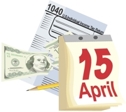How tax planning can put more $ in your pocket

Judging from some of the tax returns we see, many people seem to be of the opinion that it’s a good idea to give the government an interest-free loan every year. They withhold more from their wages than they need to, then get a big refund in April.
No law requires wage-earners to withhold more taxes from their pay than what they owe. Yet many people do just that because of poor planning or by design, thinking that getting a big refund is a kind of forced saving.
Managing tax withholding affects not only what you owe (or receive as a refund), but it affects your cash flow, too. By managing your income-tax withholding, you can put more money into your pocket every pay day.
The key is to have enough withheld for federal income tax purposes to avoid interest and penalties. As long as you meet the following federal thresholds, no interest or penalty will apply, no matter what you owe:
For taxpayers whose adjusted gross income is $150,000 or less:
- 100% of the prior year’s tax liability;
- 90% of the current year’s liability; or
- Tax owed of $1,000 or less.
For taxpayers whose adjusted gross income is more than $150,000:
- 110% of the prior year’s liability;
- 90% of the current year’s liability; or
- Tax owed of $1,000 or less.
Illinois taxpayers may owe interest and penalties if their tax exceeds their withholding by $500 or more, and they did not make estimated payments when required.
By doing a thorough analysis of a client’s tax situation, we can determine with a high degree of accuracy their withholding and their liability for the year. Clients who are in solid control of their finances should withhold and make estimated payments equal to the threshold amounts. They should have liquid funds available to pay any additional tax when due.
Some circumstances that may make planning more of a challenge early in the year are when a client has irregular self-employment income; investment income that is difficult to predict; income from trusts or pass-through entities; or large bonuses from employment. When any of these circumstances apply, estimated-tax payments may be made by Jan. 15 of the following year.



